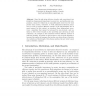Free Online Productivity Tools
i2Speak
i2Symbol
i2OCR
iTex2Img
iWeb2Print
iWeb2Shot
i2Type
iPdf2Split
iPdf2Merge
i2Bopomofo
i2Arabic
i2Style
i2Image
i2PDF
iLatex2Rtf
Sci2ools
CRYPTO
2005
Springer
2005
Springer
New Monotones and Lower Bounds in Unconditional Two-Party Computation
Since bit and string oblivious transfer and commitment, two primitives of paramount importance in secure two- and multi-party computation, cannot be realized in an unconditionally secure way for both parties from scratch, reductions to weak information-theoretic primitives as well as between different variants of the functionalities are of great interest. In this context, we introduce three independent monotones—quantities that cannot be increased by any protocol—and use them to derive lower bounds on the possibility and efficiency of such reductions. An example is the transition between different versions of oblivious transfer, for which we also propose a new protocol allowing to increase the number of messages the receiver can choose from at the price of a reduction of their length. Our scheme matches the new lower bound and is, therefore, optimal.
CRYPTO 2005 | Oblivious Transfer | String Oblivious Transfer | Weak Information-theoretic Primitives |
| Added | 26 Jun 2010 |
| Updated | 26 Jun 2010 |
| Type | Conference |
| Year | 2005 |
| Where | CRYPTO |
| Authors | Stefan Wolf, Jürg Wullschleger |
Comments (0)

